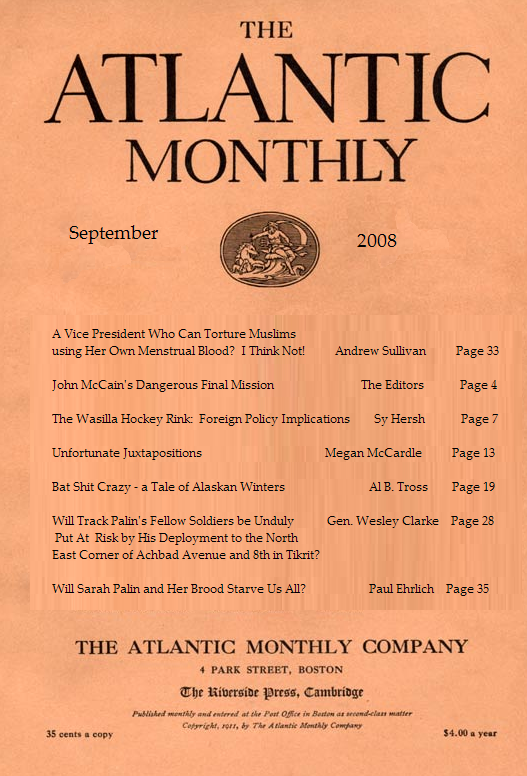There is an article in the New York Times magazine on the McCain campaign that should have waited until after the election for publication but it has the story of the Palin nomination. There has been a lot of nonsense written about this. This looks like the definitive version.
On Sunday, Aug. 24, Schmidt and a few other senior advisers again convened for a general strategy meeting at the Phoenix Ritz-Carlton. McInturff, the pollster, brought somewhat-reassuring new numbers. The Celebrity motif had taken its toll on Obama. It was no longer third and nine, the pollster said — meaning, among other things, that McCain might well be advised to go with a safe pick as his running mate.
Then for a half-hour or so, the group reviewed names that had been bandied about in the past: Gov. Tim Pawlenty (of Minnesota) and Gov. Charlie Crist (of Florida); the former governors Tom Ridge (Pennsylvania) and Mitt Romney (Massachusetts); Senator Joe Lieberman (Connecticut); and Mayor Michael Bloomberg (New York). From a branding standpoint, they wondered, what message would each of these candidates send about John McCain? McInturff’s polling data suggested that none of these candidates brought significantly more to the ticket than any other.
“What about Sarah Palin?” Schmidt asked.
After a moment of silence, Fred Davis, McCain’s creative director (and not related to Rick), said, “I did the ads for her gubernatorial campaign.” But Davis had never once spoken with Palin, the governor of Alaska. Since the Republican Governors Association had paid for his work, Davis was prohibited by campaign laws from having any contact with the candidate. All Davis knew was that the R.G.A. folks had viewed Palin as a talent to keep an eye on. “She’d certainly be a maverick pick,” he concluded.
The meeting carried on without Schmidt or Rick Davis uttering an opinion about Palin. Few in the room were aware that the two had been speaking to each other about Palin for some time now. Davis was with McCain when the two met Palin for the first time, at a reception at the National Governors Association winter meeting in February, in the J. W. Marriott Hotel in Washington. It had not escaped McCain’s attention that Palin had blasted through the oleaginous Alaska network dominated by Frank Murkowski and Ted Stevens, much in the same manner that McCain saw himself doing when he was a young congressman. Newt Gingrich and others had spoken of Palin as a rising star. Davis saw something else in Palin — namely, a way to re-establish the maverick persona McCain had lost while wedding himself to Bush’s war. A female running mate might also pick off some disaffected Hillary Clinton voters.
After that first brief meeting, Davis remained in discreet but frequent contact with Palin and her staff — gathering tapes of speeches and interviews, as he was doing with all potential vice-presidential candidates. One tape in particular struck Davis as arresting: an interview with Palin and Gov. Janet Napolitano, the Arizona Democrat, on “The Charlie Rose Show” that was shown in October 2007. Reviewing the tape, it didn’t concern Davis that Palin seemed out of her depth on health-care issues or that, when asked to name her favorite candidate among the Republican field, she said, “I’m undecided.” What he liked was how she stuck to her pet issues — energy independence and ethics reform — and thereby refused to let Rose manage the interview. This was the case throughout all of the Palin footage. Consistency. Confidence. And . . . well, look at her. A friend had said to Davis: “The way you pick a vice president is, you get a frame of Time magazine, and you put the pictures of the people in that frame. You look at who fits that frame best — that’s your V. P.”
Schmidt, to whom Davis quietly supplied the Palin footage, agreed. Neither man apparently saw her lack of familiarity with major national or international issues as a serious liability. Instead, well before McCain made his selection, his chief strategist and his campaign manager both concluded that Sarah Palin would be the most dynamic pick. Despite McInturff’s encouraging new numbers, it remained their conviction that in this ominous election cycle, a Republican presidential candidate could not afford to play it safe. Picking Palin would upend the chessboard; it was a maverick type of move. McCain, the former Navy pilot, loved that sort of thing. Then again, he also loved familiarity — the swashbuckling camaraderie with his longtime staff members, the P.O.W. band of brothers who frequently rode the bus and popped up at his campaign events, the Sedona ranch where he unwound and grilled wagonloads of meat. By contrast, McCain had barely met Palin.
That evening of Aug. 24, Schmidt and Davis, after leaving the Ritz-Carlton meeting, showed up at McCain’s condominium in Phoenix. They informed McCain that in their view, Palin would be the best pick. “You never know where his head is,” Davis told me three weeks later. “He doesn’t betray a lot. He’s a great poker player. But he picked up the phone.” Reached at the Alaska State Fair, Palin listened as McCain for the first time discussed the possibility of selecting her as his running mate.
These machinations remained thoroughly sub rosa. McCain’s close friend, Lindsey Graham, the South Carolina senator, continued to argue passionately for Lieberman — “a McCain-Plus ticket,” he would say. McCain, referring to Romney, at one point said that “Mitt’s been awfully helpful with fund-raising,” according to a senior aide who was present during the discussion. “And he’d bring us Michigan.” Pawlenty’s name frequently came up in internal discussions, says that aide. But as for Palin, says another: “She just wasn’t one of the names. I mean, we heard more about Bloomberg.”
On Tuesday, Aug. 26, Schmidt picked up the phone around noon and called Jon Berrier, an old friend and partner at Schmidt’s consulting business in Northern California. Berrier was asked to get on a plane to Anchorage, check into a hotel, await further details and tell no one. The next morning, Davis White, who oversaw all of McCain’s travel logistics, met Berrier for breakfast in Anchorage. White informed Berrier that they would meet Palin at a private airstrip that afternoon, and that White would fly with Palin to Arizona to meet with Schmidt and Salter that evening — and then, the following morning, with McCain. If McCain offered the vice-president slot to Palin, White told Berrier, then Berrier would surreptitiously fly Palin’s husband, Todd, and their children to Ohio on Thursday evening, and a public announcement would be made there the next morning. The final decision wasn’t to be made until Thursday morning, but they should proceed as if it was going to happen.
Palin and her assistant, Kris Perry, met Schmidt and Salter on Wednesday evening in Flagstaff, at the house of Bob Delgado, the chief executive of Hensley & Company, Cindy McCain’s beer distributorship. McCain’s speechwriter had never spoken with Palin before. A senior adviser said: “Salter was always a big Pawlenty fan — son of a truck driver, salt of the earth, genuine guy. Just thought he was a good, honest addition to the McCain brand as opposed to, say, Romney.” That so much momentum had been building in Palin’s favor was likely a surprise to Salter, says one of the few individuals privy to the vice-presidential selection process: “Mark was new to it, and so it was important to us to make sure that he was in on the situation that was brewing.”
For two hours, Salter and Schmidt asked Palin questions based on the vetting material. Salter says they discussed her daughter’s pregnancy and the pending state investigation regarding her role in the controversy surrounding the state trooper who had been married to her sister. The two advisers warned her that nothing was likely to stay secret during the campaign. Salter says that he was impressed. “The sense you immediately get is how tough-minded and self-assured she is,” he recalled three weeks after meeting her. “She makes that impression in like 30 seconds.”
Now all three of McCain’s closest advisers were on board. The next morning was Thursday, Aug. 28. Salter and Schmidt drove Palin to McCain’s ranch. According to Salter, the senator took the governor down to a place where he usually had his coffee, beside a creek and a sycamore tree, where a rare breed of hawk seasonally nested. They spoke for more than an hour. Then the two of them walked about 40 yards to the deck of the cabin where the McCains slept. Cindy joined them there for about 15 minutes, after which the McCains excused themselves and went for a brief stroll to discuss the matter. When they returned, McCain asked for some time with Schmidt and Salter. “And we did our pros and cons on all of them,” Salter told me. “He just listened. Asked a couple of questions. Then said, ‘I’m going to offer it to her.’ ”
Late that same evening, a McCain spokeswoman, Nicolle Wallace, and the deputy speechwriter, Matthew Scully, were ferried to the Manchester Inn in Middletown, Ohio. Schmidt instructed them to turn off their cellphones and BlackBerrys. Then he opened the door of Room 508 and introduced them to McCain’s running mate. The two aides were surprised. Palin and Scully spoke for about 45 minutes, and the governor handed him a copy of the speech she had intended to give as one of the Republican convention’s many guest speakers. With this scant information in hand, Scully began his all-night drafting of Palin’s first speech to a national audience.
During the evening, Scully also traded e-mail messages with Matt McDonald, who had just gotten the news from Schmidt that the vice-presidential pick was someone who did not quite fit the campaign’s current emphasis on “readiness.” The story line, Schmidt informed McDonald, was now Change. The two of them, along with Rick Davis, talked through this rather jolting narrative shift. What they decided upon was workable, if inelegant. First, define the problem as Washington, not Bush. Second, posit both McCain and Palin as experienced reformers. And third, define Obama and his 65-year-old running mate, Senator Joe Biden, as a ticket with no real record of change. McDonald in turn transmitted this formulation to Scully and Salter, who was busily drafting McCain’s announcement speech.
The spunky hockey mom that America beheld the next morning instantly hijacked Obama’s narrative of newness. (“Change is coming!” McCain hollered, almost seeming startled himself.) And five days later, in the hours after Palin’s stunningly self-assured acceptance speech at the G.O.P. convention, I watched as the Republicans in the bar of the Minneapolis Hilton rejoiced as Republicans had not rejoiced since Inauguration Night three and a half long years ago. Jubilant choruses of “She knocked it out of the park” and “One of the greatest speeches ever” were heard throughout the room, and some people gave, yes, Obama-style fist bumps.
When the tall, unassuming figure of Palin’s speechwriter, Matthew Scully, shuffled into the bar, he was treated to the first standing ovation of his life. Nicolle Wallace confessed to another staff member that she had cried throughout Palin’s speech. Allowing his feelings to burst out of his composed eggshell of a face, Schmidt bellowed to someone, “Game on!”



